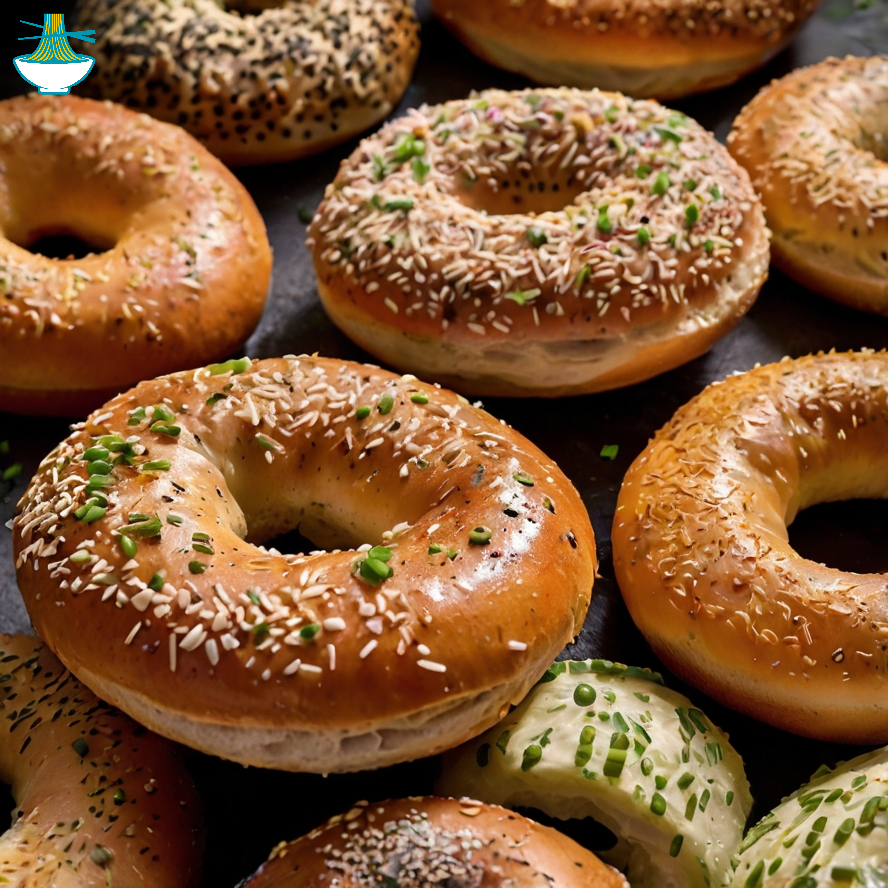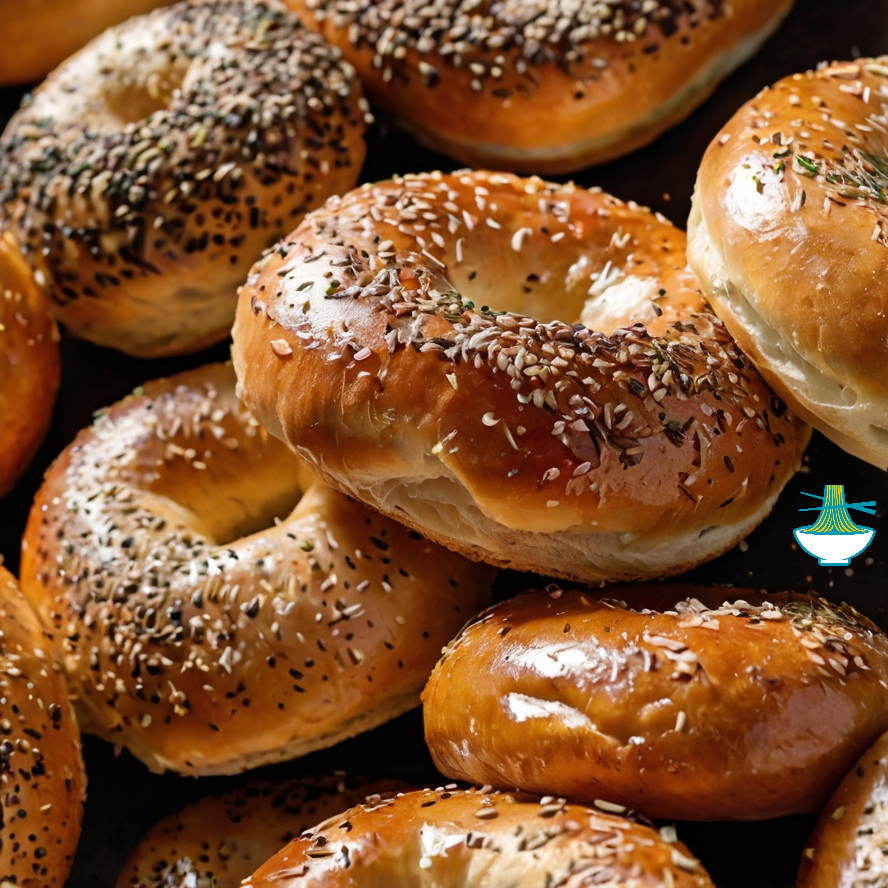Montreal-style bagels are a distinctive variety of bagels that stand out due to their dense texture, slightly sweet flavor, and unique shape. These bagels are boiled in honey-sweetened water and baked in a wood-fired oven, resulting in a crispy crust and chewy interior. Unlike the larger, softer New York-style bagels, Montreal-style bagels are smaller and denser, with a more pronounced sweetness from honey or malt syrup used in the dough.

Montreal-style bagels trace their roots back to the Jewish communities of Montreal in the early 20th century. This style of bagel was developed by Eastern European Jewish immigrants who sought to recreate the bagels of their homeland. They introduced their own variations, including the use of honey or malt syrup in the dough and baking in a wood-fired oven, which became defining features of Montreal-style bagels. The distinctive shape and method of boiling the bagels in sweetened water were influenced by traditional techniques from the bagel-making practices of Eastern Europe.
Ingredients
- 1 1/2 cups warm water
- 2 tbsp active dry yeast
- 1/4 cup granulated sugar
- 1/4 cup honey
- 2 tsp salt
- 4 cups bread flour
- 1 egg
- 1 tbsp water
- Sesame seeds or poppy seeds (optional)
Instructions
1. Activate Yeast: In a large mixing bowl, combine warm water, yeast, and sugar. Let sit for 5-10 minutes until foamy.
2. Prepare Dough: Add honey and salt to the mixture. Stir until dissolved. Gradually mix in flour until a stiff dough forms. Knead on a floured surface for 10-15 minutes until smooth and elastic.
3. First Rise: Place dough in a greased bowl, cover with a towel, and let rise in a warm place for 1-2 hours, or until doubled in size.
4. Shape Bagels: Preheat oven to 450°F (230°C). Divide dough into 12 pieces. Roll each into a ball, poke a hole in the center, and stretch to 1-2 inches in diameter.
5. Boil Bagels: Bring a large pot of water to a boil. Add remaining honey. Boil bagels for 1-2 minutes per side. Remove with a slotted spoon.
6. Prepare for Baking: Mix egg and water. Brush onto bagels and sprinkle with seeds if desired.
7. Bake: Bake bagels for 15-20 minutes until golden brown and crispy. Cool on a wire rack before serving.
Notes
- Traditional Montreal-style bagels use malt syrup instead of honey, but honey is an acceptable substitute.
- A wood-fired oven is ideal for baking, but a regular oven can also be used.
- Serve with cream cheese, butter, or other toppings like smoked salmon for a traditional experience.

Nutrition Value:
1. 1 1/2 cups warm water
- Calories: 0
- Carbohydrates: 0 g
- Protein: 0 g
- Fat: 0 g
- Sodium: 0 mg
- Cholesterol: 0 mg
- Vitamins & Minerals: Trace amounts depending on mineral content of the water
- Nutritional Benefit: Provides hydration and helps activate yeast in dough.
2. 2 tbsp active dry yeast
- Calories: 60
- Carbohydrates: 8 g
- Protein: 6 g
- Fat: 0.5 g
- Sodium: 10 mg
- Cholesterol: 0 mg
- Vitamins: Rich in B-vitamins (B1, B2, B3, B5, B6, B7, B9)
- Minerals: Significant amounts of iron, magnesium, potassium, and zinc
- Nutritional Benefit: High in protein and B-vitamins, helps with energy metabolism and supports overall health.
3. 1/4 cup granulated sugar
- Calories: 200
- Carbohydrates: 50 g
- Protein: 0 g
- Fat: 0 g
- Sodium: 0 mg
- Cholesterol: 0 mg
- Vitamins & Minerals: Minimal amounts
- Nutritional Benefit: Provides sweetness and helps in the fermentation process of yeast.
4. 1/4 cup honey
- Calories: 256
- Carbohydrates: 69 g
- Protein: 0.3 g
- Fat: 0 g
- Sodium: 4 mg
- Cholesterol: 0 mg
- Vitamins: Contains small amounts of B-vitamins and vitamin C
- Minerals: Trace amounts of calcium, iron, magnesium, potassium, and zinc
- Nutritional Benefit: Provides natural sweetness, antioxidants, and has potential antimicrobial properties.
5. 2 tsp salt
- Calories: 0
- Carbohydrates: 0 g
- Protein: 0 g
- Fat: 0 g
- Sodium: 2,300 mg
- Cholesterol: 0 mg
- Vitamins & Minerals: Contains sodium
- Nutritional Benefit: Enhances flavor and regulates fluid balance in the body. Excessive intake should be monitored.
6. 4 cups bread flour
- Calories: 1,600
- Carbohydrates: 320 g
- Protein: 48 g
- Fat: 8 g
- Sodium: 0 mg
- Cholesterol: 0 mg
- Vitamins: Enriched flour may contain B-vitamins (e.g., folic acid)
- Minerals: Includes iron
- Nutritional Benefit: Provides essential carbohydrates and protein for energy and dough structure. Enriched versions add extra nutrients.
7. 1 egg
- Calories: 70
- Carbohydrates: 0.6 g
- Protein: 6 g
- Fat: 5 g
- Sodium: 70 mg
- Cholesterol: 185 mg
- Vitamins: Rich in vitamins A, D, E, and B12
- Minerals: Contains iron, phosphorus, and selenium
- Nutritional Benefit: Provides high-quality protein, essential fatty acids, and various vitamins and minerals important for overall health.
8. 1 tbsp water
- Calories: 0
- Carbohydrates: 0 g
- Protein: 0 g
- Fat: 0 g
- Sodium: 0 mg
- Cholesterol: 0 mg
- Vitamins & Minerals: Trace amounts depending on mineral content of the water
- Nutritional Benefit: Helps to bind ingredients and adjust dough consistency.
9. Sesame seeds (optional)
- Calories: 52
- Carbohydrates: 2 g
- Protein: 1.6 g
- Fat: 4.5 g
- Sodium: 1 mg
- Cholesterol: 0 mg
- Vitamins: Contains B-vitamins and vitamin E
- Minerals: Rich in calcium, iron, magnesium, and zinc
- Nutritional Benefit: Adds flavor, healthy fats, protein, and a variety of vitamins and minerals.
10. Poppy seeds (optional)
- Calories: 43
- Carbohydrates: 1.8 g
- Protein: 1.3 g
- Fat: 3.7 g
- Sodium: 1 mg
- Cholesterol: 0 mg
- Vitamins: Contains B-vitamins and some vitamin E
- Minerals: High in calcium, iron, magnesium, and phosphorus
- Nutritional Benefit: Provides healthy fats, protein, and essential minerals. Adds a nutty flavor and texture.


Comments